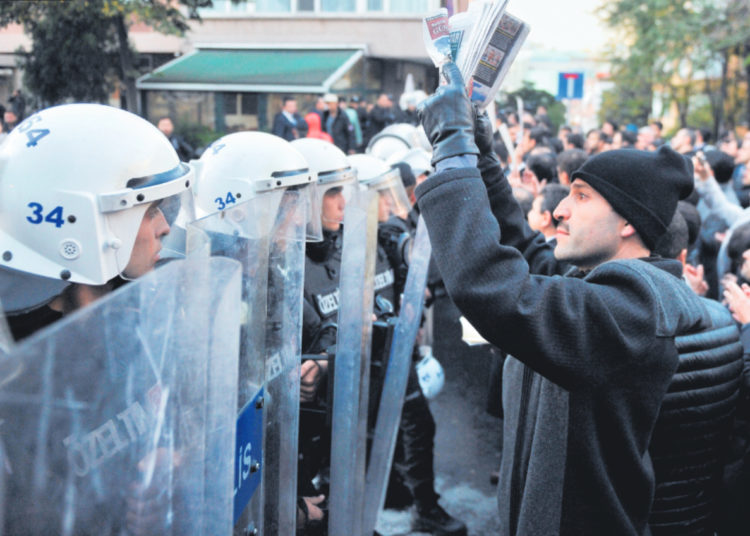The attack on the free, independent and opposition media in Turkey by the government of President Recep Tayyip Erdoğan is anything but random. In fact, the seizure of leading national daily Bugün in 2015 after the daily ran a major investigative report that revealed how Turkey helped jihadist groups in Syria is a perfect example of the real motivation behind the unprecedented crackdown on the press.
Bugün was part of the İpek media group, the third largest media outlet in Turkey at the time. It was owned by Koza İpek Holding, which was also the owner of two national networks, Kanaltürk and Bugün TV, the Millet daily, one radio station and the English-language news website BGNNews.com. On September 1, 2015 the daily published still shots of CCTV video footage that showed a large amount of materials, including explosives, construction pipes, large metal plates and fertilizer ingredients, being transferred to the Islamic State in Iraq and the Levant (ISIL) from Turkey’s Akçakale border gate in southeastern Şanlıurfa province while Turkish customs officials stood by and watched.



The materials and weapons that were moved into ISIL-controlled territory in Syria are seen in the footage, and images captured from CCTV showed enough materials to fill numerous trucks. The materials included metal plates weighing 400 to 500 kilograms, which ISIL mounts on vehicles as armor, construction pipes for firing mortars and electric cables for explosives. The quantities being transported on a daily basis were apparently very large. Two trucks of fertilizer used in explosives, in addition to materials such as electric cables and fuses, enough to fill a truck each, had been passing through Turkey’s Akçakale border gate, heading for ISIL-controlled parts of Syria, for the previous two months.



On the day the newspaper ran the headline story, raids were authorized on the offices of the Ipek group on accusations of financial irregularities and alleged links to the Gülen movement, when in fact government auditors had provided a clean bill of health for the finances of the holding after going through several detailed audits for two years running. Koza İpek Holding was active in several sectors including media, energy and mining.

The police raid was nothing but a message of intimidation for journalists and the owner, Akin Ipek, for exposing the Erdogan government’s aiding and abetting of jihadist groups. On the same day the Sanliurfa Governor’s Office issued a statement denying the report and claiming that the border gate had been closed to vehicles since Jan. 7, 2014 after ISIL took it over.

Editor-in-Chief of the Bugün daily Erhan Başyurt posted several tweets on his personal Twitter account, saying: “A police operation that aims to silence our group has started. Police raided our office. How shameful!” “The operation came right after we revealed the illegal shipment of weapons to ISIL,” he said in another tweet. The operations were conducted by the Finance Ministry’s Financial Crimes Investigation Board (MASAK), and the warrant was issued by Ankara 7th Penal Court of Peace judge Mustafa Çorumlu. The warrant included the search of the media outlets as well.

Commenting on the operation against his companies, İpek released a written statement at the time saying that the police had raided his house and even his children’s houses in the early morning hours, adding that he and his companies were not involved in any illegal or inappropriate acts. “There is no question about me left unasked by the prosecutor over the course of two years. There was just slander in certain media outlets [referring to pro-government media outlets],” İpek said, adding, “I haven’t ever even had a traffic ticket.”

The Bugün newspaper vowed to continue its independent and critical editorial line despite pressure by the government. On Oct. 22, 2015 prosecutors and judges appointed by the Erdogan government issued a new warrant to seize all 22 companies owned by the İpek family, including media outlets. Police officers forced their way into Koza İpek Holding headquarters in Ankara on Oct. 27, using tear gas on protesters who had gathered to support the firm. A similar display of brute force was seen in taking over the media outlets in Istanbul.

The government trustee halted that day’s edition immediately after he took over the newsroom with the help of the police officers. The editors had earlier finalized the edition for the day and had even shared the pages they had prepared for publication via social media after the raid. The government’s selection of a trustee told the tale. The newspaper that was killed for running the ISIL story was entrusted to Hasan Ölçer, a lawyer who represented Salih Mirzabeyoğlu, leader of armed radical group the Islamic Great East Raiders Front (İBDA-C), which has been key to grooming Turkish militants for al-Qaeda. Mirzabeyoğlu was sentenced to life in prison on charges of attempting to overturn the constitutional order in a case in which Ölçer was also a suspect.
Mirzabeyoğlu was released in 2014 after serving 16 years following a retrial with the help of Turkish President Erdogan, who sought his council after his release. This radical figure, nicknamed Commandant, passed away in May 2018. Ölçer turned the Bugün daily into a government mouthpiece overnight, fired most editors including Editor-in-Chief Basyurt. The daily was shut down by the government a year later. The archives of the newspaper including online editions were entirely deleted by government operatives.












